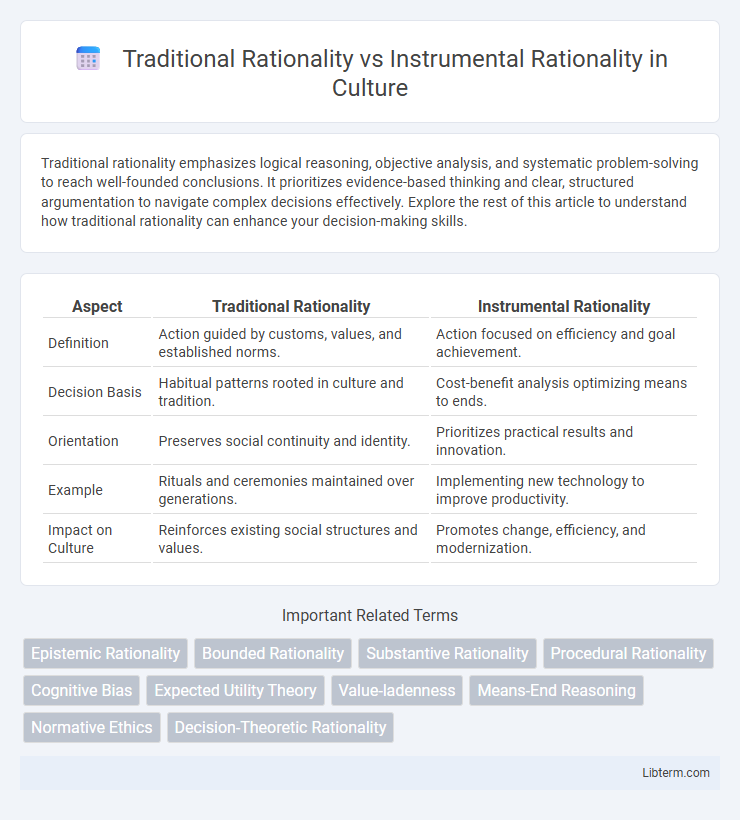Traditional rationality emphasizes logical reasoning, objective analysis, and systematic problem-solving to reach well-founded conclusions. It prioritizes evidence-based thinking and clear, structured argumentation to navigate complex decisions effectively. Explore the rest of this article to understand how traditional rationality can enhance your decision-making skills.
Table of Comparison
| Aspect | Traditional Rationality | Instrumental Rationality |
|---|---|---|
| Definition | Action guided by customs, values, and established norms. | Action focused on efficiency and goal achievement. |
| Decision Basis | Habitual patterns rooted in culture and tradition. | Cost-benefit analysis optimizing means to ends. |
| Orientation | Preserves social continuity and identity. | Prioritizes practical results and innovation. |
| Example | Rituals and ceremonies maintained over generations. | Implementing new technology to improve productivity. |
| Impact on Culture | Reinforces existing social structures and values. | Promotes change, efficiency, and modernization. |
Understanding Traditional Rationality
Traditional rationality is rooted in customs, social norms, and long-established practices that guide behavior within a community. It prioritizes conformity to cultural values and collective wisdom rather than solely focusing on efficiency or goals. This form of rationality emphasizes the preservation of societal cohesion and continuity over individual instrumental gains.
Defining Instrumental Rationality
Instrumental rationality refers to the process of selecting the most efficient means to achieve specific goals based on logical evaluation and cost-benefit analysis. Unlike traditional rationality, which emphasizes adherence to customs and established norms, instrumental rationality prioritizes practicality and outcome optimization. This concept is fundamental in economics and decision theory, where rational agents are modeled to maximize utility through calculated actions.
Historical Roots of Rational Thought
Traditional rationality traces its roots to ancient philosophical traditions, emphasizing adherence to established customs and moral values as guidance for reasoning. Instrumental rationality emerged during the Enlightenment, prioritizing logical calculation and efficiency in achieving specific goals or outcomes. These contrasting approaches reflect the evolution of rational thought from normative frameworks to pragmatic problem-solving methods in historical contexts.
Key Differences Between Traditional and Instrumental Rationality
Traditional rationality is guided by established norms, values, and cultural practices prioritizing social cohesion and adherence to moral traditions. Instrumental rationality centers on the calculation of the most efficient means to achieve specific goals, emphasizing pragmatic decision-making and utility maximization. The key differences lie in traditional rationality's focus on preserving collective norms versus instrumental rationality's focus on goal-oriented problem solving.
Philosophical Foundations of Rationality
Traditional rationality is grounded in moral, cultural, and intrinsic values, valuing reason as a guide to ethical behavior and truth-seeking. Instrumental rationality emphasizes efficiency and goal achievement by selecting the most effective means to an end, often linked to decision theory and economic models. Philosophical foundations distinguish these rationalities through debates on value-driven reasoning versus outcome-oriented calculation within epistemology and ethics.
Real-World Applications and Outcomes
Traditional rationality emphasizes adherence to established cultural norms and values in decision-making, often guiding behavior through collective meaning and moral frameworks. Instrumental rationality prioritizes efficiency and goal-oriented strategies, optimizing actions to achieve specific outcomes regardless of cultural or ethical considerations. In real-world applications such as organizational management and policy-making, instrumental rationality tends to drive innovation and measurable results, while traditional rationality supports social cohesion and ethical consistency.
Limitations of Traditional Rationality
Traditional rationality is limited by its reliance on customs, habits, and established norms, which can hinder adaptability in rapidly changing environments. It often fails to account for efficiency and goal-oriented behavior, leading to decisions that prioritize conformity over practical outcomes. This approach may struggle to address complex, novel problems where instrumental rationality, focused on optimizing means to achieve specific ends, proves more effective.
Strengths and Weaknesses of Instrumental Rationality
Instrumental rationality excels in achieving specific goals efficiently by selecting the most effective means based on clear criteria, making it highly practical in problem-solving and decision-making contexts. However, its focus on outcomes can lead to overlooking ethical considerations, intrinsic values, and long-term consequences, limiting its applicability in complex social or moral dilemmas. This narrow emphasis risks promoting short-sighted decisions that maximize immediate benefits at the expense of broader, non-instrumental human values.
Case Studies: Rationality in Practice
Case studies in traditional rationality reveal decision-making grounded in cultural norms and ethical values, often prioritizing long-term societal harmony over immediate outcomes. Instrumental rationality cases emphasize efficiency and goal-oriented strategies, typically reflected in business and economic contexts where maximizing utility guides choices. Analysis of these practices shows how contextual factors influence rationality, with traditional rationality favoring collective well-being and instrumental rationality focusing on measurable success.
Future Directions in Rationality Research
Future directions in rationality research emphasize integrating traditional rationality's normative principles with instrumental rationality's goal-oriented strategies to enhance decision-making frameworks. Advances in cognitive science and artificial intelligence offer innovative methods to model hybrid rational agents that adaptively balance ethical considerations and efficiency. Emerging interdisciplinary approaches aim to develop dynamic, context-sensitive rationality models for improved predictions and real-world applications.
Traditional Rationality Infographic

 libterm.com
libterm.com